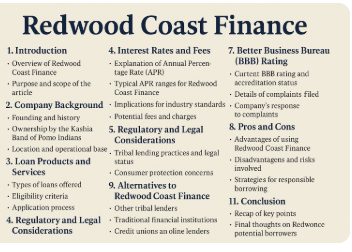Introduction
Redwood Coast Finance is a tribal lending company that has gained attention for its fast installment loans aimed at individuals who may not qualify for traditional financial services. Based in California and owned by the Kashia Band of Pomo Indians of Stewarts Point Rancheria, the company claims to offer accessible financial solutions, especially for those with bad credit. However, behind this accessibility lies a complex world of high-interest rates, regulatory gray areas, and varying customer experiences.
This detailed and user-friendly guide breaks down everything you need to know about Redwood Coast Finance, helping you make informed financial decisions.
Company Background
Redwood Coast Finance was established with the intent to provide short-term loans to consumers in need of fast cash. It operates under the sovereignty of the Kashia Band of Pomo Indians, a federally recognized tribe in California. This tribal affiliation means Redwood Coast Finance functions outside typical state financial regulations, adhering instead to tribal laws.
While this gives the company certain legal freedoms, it also raises questions about consumer protection and legal recourse for borrowers who may encounter issues.
Loan Products and Services
Redwood Coast Finance primarily offers installment loans. These are small-dollar loans that are repaid in fixed, scheduled payments rather than in a single lump sum.
Loan Amounts and Terms:
| Borrower Type | Loan Range | Repayment Period |
|---|---|---|
| First-time Borrower | Up to $500 | 6–12 months |
| Returning Customer | Up to $1,000 | Varies |
To apply, borrowers typically need to provide proof of income, identification, and a checking account. The application process is entirely online, with approvals sometimes given within 24 hours.
Redwood Coast Finance markets itself as a convenient solution for emergency expenses, such as medical bills, auto repairs, or rent.
Interest Rates and Fees
One of the most important considerations when dealing with Redwood Coast Finance is the cost of borrowing. The company has been reported to charge Annual Percentage Rates (APRs) as high as 699%. This is significantly higher than what is typically seen in traditional banking or even most credit card interest rates.
Sample Interest Rate Breakdown:
| Loan Amount | APR | Total Repayment (Approx.) |
| $500 | 450% | $1,800+ |
| $750 | 550% | $2,625+ |
| $1,000 | 699% | $3,990+ |
These rates can make repayment extremely difficult, particularly for low-income borrowers. Additional fees may include late payment charges and non-sufficient funds (NSF) fees.
Regulatory and Legal Considerations
As a tribal lender, Redwood Coast Finance is not subject to the same state regulations that govern other financial institutions. This means it does not need to follow certain state-imposed interest rate caps or lending practices. While the company is legally protected under tribal sovereignty, this can leave borrowers without the protections they might expect from traditional lenders.
Borrowers who experience problems may find it difficult to pursue legal action, as Redwood Coast Finance generally asserts that any disputes must be handled through tribal courts.
Customer Reviews and Reputation
Redwood Coast Finance has garnered a wide array of customer feedback, much of it negative. On platforms like the Better Business Bureau (BBB), the company holds an “F” rating. Customers have reported a range of issues, including unclear loan terms, unexpected charges, and poor customer service.
Some of the most common complaints include:
- Extremely high interest rates.
- Unresponsive or unhelpful customer service.
- Confusing loan agreements.
- Difficulty in repaying due to inflated total costs.
That said, there are also customers who appreciate the speed and ease of access to funds, especially in emergency situations. Still, the overwhelming sentiment suggests caution.
Better Business Bureau (BBB) Rating
Redwood Coast Finance is not accredited by the BBB and currently holds an “F” rating. This rating stems from a pattern of complaints and the company’s failure to respond to many of them.
Here’s a quick look at the BBB performance:
- Accreditation Status: Not accredited
- Rating: F
- Complaints Closed in Last 3 Years: 40+
- Complaints Closed in Last 12 Months: 20+
The lack of responsiveness to complaints further exacerbates concerns about accountability and customer service.
Pros and Cons
Understanding the benefits and drawbacks can help potential borrowers decide whether Redwood Coast Finance is right for them.
Pros:
- Quick access to funds.
- Easy online application.
- No credit score requirements.
Cons:
- Extremely high interest rates (up to 699%).
- Lack of regulatory oversight.
- Poor customer service reputation.
- Risk of debt cycle.
Alternatives to Redwood Coast Finance
If you’re considering borrowing money, it’s essential to explore alternatives that may be more financially responsible:
Safer Alternatives:
| Option | Description |
| Personal Loans from Banks | Typically lower APRs and better transparency |
| Credit Union Loans | Member-focused lending with fairer terms |
| Peer-to-Peer Lending | Competitive rates through platforms like LendingClub |
| Payday Advance Apps | Earnin, Brigit, and Dave offer early access to wages |
| Local Assistance Programs | Churches, nonprofits, or city grants for emergencies |
These alternatives may offer a more affordable and less risky way to manage short-term financial needs.
Tips for Borrowers
If you decide to proceed with Redwood Coast Finance—or any lender—keep these tips in mind:
- Read the fine print. Understand the APR, repayment terms, and any penalties.
- Borrow only what you need. Overborrowing can trap you in a debt cycle.
- Have a repayment plan. Make sure you can meet payment schedules.
- Explore alternatives first. See if friends, family, or a credit union can help.
- Seek financial advice. Many nonprofits offer free credit counseling services.
Conclusion
Redwood Coast Finance offers a quick and easy way to get emergency cash, especially for individuals with bad credit or no access to traditional banking. However, this convenience comes at a steep cost—literally. With APRs that can reach nearly 700%, limited consumer protections, and a problematic reputation, borrowers must exercise extreme caution.
Related Articles
Complete Guide to Financial Updates Aggr8Finance
Vending Machine Business for Sale: A Complete Beginner’s Guide to Starting, Buying & Succeeding
Can Ear Infection Cause Jaw Ache? A Complete Guide to Understanding the Connection
The Ultimate Guide to Chewable Cough Medicine for Kids – Safe & Effective Options

